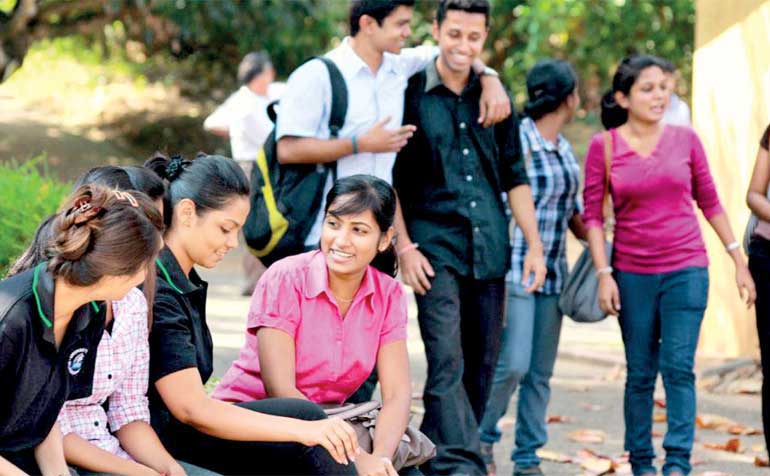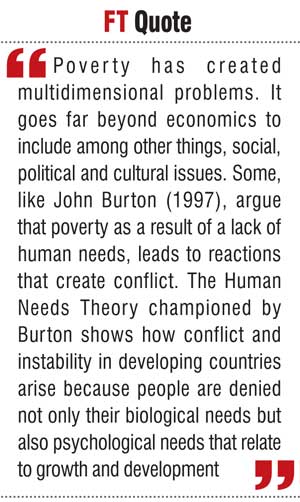Tuesday Feb 24, 2026
Tuesday Feb 24, 2026
Monday, 22 August 2016 00:01 - - {{hitsCtrl.values.hits}}
 The Youth Commission (1990) has repetitively urged in a report it complied that vocational training facilities be increased so that youth will be able to acquire non-academic skills and join the private sector or engage in self-employment. The report says that there is a grave mismatch between education and employment.
The Youth Commission (1990) has repetitively urged in a report it complied that vocational training facilities be increased so that youth will be able to acquire non-academic skills and join the private sector or engage in self-employment. The report says that there is a grave mismatch between education and employment.
The report further states that the “problem of generating employment is a far-reaching one requiring the Government to engage in systemic planning”. It adds that “experts are of the view that the economy would have to grow at a rate of 7%-13% and at present it seems unlikely that we will meet such targets”.
The report goes on to state that “economic growth will only be a success if realistic policies for industrialisation are introduced”. It also says that “Sri Lanka will not be able to extricate herself unless we attempt to achieve the desired growth rates”.Elected representatives have neglected their responsibility to ensure a decent future for the people. Haven’t they created inequality?
Adam Smith over two centuries ago had said: “Little else is requisite to carry a state to the highest degree of opulence from the lowest barbarism, but peace, easy taxes and a tolerable administration of justice; all the rest being brought about by natural course of things.”
Shouldn’t we remember that due to internal conflicts and insecurity, development in the country at most times was seriously affected. As a result, the cost of conflicts in terms of the loss of human life, property and social infrastructure has been enormous. Scarce resources had inevitably been diverted to the purchase of military equipment, etc. at the expense of socioeconomic development. Experts believe that among many factors political corruption has dragged us into poverty and led to weak governance and institutions. Aren’t we therefore poorer than the days prior to independence six decades ago?
 Poverty
Poverty
Poverty has created multidimensional problems. It goes far beyond economics to include among other things, social, political and cultural issues. Some, like John Burton (1997), argue that poverty as a result of a lack of human needs, leads to reactions that create conflict. The Human Needs Theory championed by Burton shows how conflict and instability in developing countries arise because people are denied not only their biological needs but also psychological needs that relate to growth and development.
According to experts, social strife and revolutions are not brought about by the conspiratorial or malignant nature of man but from poverty and distributive injustice.
The commissioners had mentioned that “to alleviate what we see as a basic cause for rural youth disenchantment, we suggest that the Government reconsider its priorities which underpin resource allocation strategies to ensure a massive transfer of resources to the rural areas and to the urban slums and shanties”.
It had also mentioned: “People in their representations wanted an equitable share of resources; education, health, land, water, power fuel but government, they felt, continued a Colombo-centred development policy”.
The report had also urged that a minimum salary, which will constitute a living wage and a fair wage, be determined. Isn’t it a pity that all these have fallen on deaf ears?
The consequences are frightening. In fact, those who made representations before the Commission had stated that they wanted people-centred development, which was lacking and had wanted protection for local industries, especially, handloom etc. Those who came before the Commission had demanded decentralised administration with adequate administrative powers to the periphery.
The Commissioners had mentioned “issues of extravagance, or conspicuous consumption, together with the increasing prices of essentials” and had urged that “extravagance needs to be curtailed not only by a change of heart and by example, but also by fiscal policy; the rising cost of living is felt more when extravagance and waste is prominent. While “welfare” and “subsidies” may not be popular with some, yet the prices of basic essentials must be kept low, at least so long as minimum wages cannot be increased to a level which is considered fair”.
The country needs determined action to build a fairer economic and political system that values everyone. The lack of such a system has hindered growth and fuelled crime and violent conflicts. Couldn’t it also have thwarted potential and undermined the foundations of society.
Successive governments have failed to look into the question as to why rural youth are disinclined to seek blue collar jobs and have shown an inclination to seek white collar jobs. Accordingly, industrialists both large and small are facing serious difficulties in attracting workers. It has also been revealed that youth seek employment overseas in countries like Korea because they get better pay than in Sri Lanka. Does this mean that we need a crucial change in our perceptions in order to address all these unresolved issues even belatedly?
We now need to consider all these issues, including public debt which is also rising at an alarming rate. The increasing tax burden on the poor masses due to continuously expanding budget deficits and also due to falling customs revenue, etc. have created added problems. A trade union within the Customs Department had pointed out that due to various malpractices the Government had lost billions in Customs revenue.
The Customs law introduced in 1861, together with the amendment introduced thereafter, has given extensive powers to the Director General of Customs to take stern action against wrongdoers who defy the law for the purpose of evading of government revenue. These punitive powers also include the forfeiture of the goods and the imposition of treble the value of the goods as penalties. It is alleged that these provisions are to be diluted by proposed new laws by the Ministry of Finance.
Urban revolution
Shouldn’t we take serious note with regard to diminishing resources, excessive public debt? The Government is therefore tasked with the enterprising challenge to provide increased infrastructure facilities, clean water, sanitation, schools, housing, wider roads, improved public transport facilities, etc. relative to needs and rising expectations.
What we have experienced is increasing poverty.Most of the housing used by the poor are decrepit. Government buildings are in a state of disrepair and decay. Public transport is overcrowded and overused. Public latrines are in very bad shape. We should not forget that this is the century of the ‘urban revolution’. Over a period of around 60 years, the developing world’s urban population had increased more than even tenfold.
Experts are doubtful whether governments in the Third World can prepare themselves to meet the ever-increasing challenges before them. Shouldn’t the politicians feel ashamed because the public have now lost their patience owing to these deficiencies?
Garbage collection and disposal is a massive failure. The poor suffer from the incidence of acute respiratory diseases, diseases linked to poor sanitation and contaminated drinking water mostly owing to unhygienic environments and due to inadequate investments by successive governments.
The Japanese Government had set very clear guidelines concerning waste management. All measures have been designed to allow economic development having minimised quantities disposed on to the land.
Recycling or reuse is a key method used for reducing pressure. Japan has used technology to win the race without depending on a dwindling land-base. Shouldn’t our rulers opt for similar solutions without wasting 19-acre land to dump garbage in Wellampitiya.
Due to numerous welfare schemes that had been in operation, Sri Lankans are by nature lazy. They need quick money and do not like hard-earned money. They prefer joining the public sector thinking that they can make ill-gotten money and take life easy to improve their living standards.
The number of women joining the public service has increased enormously because they can shop, read newspapers, hang on their mobile phones, take a nap and go on leave as they wish, including no-pay, without any difficulty.
Poor and desperate Sri Lankan citizens have now become more volatile and frenzied. Lazy public officers sit in air-conditioned offices wasting both time and resources unable to find solutions to burning problems.
Our governments have however continually borrowed and spent public resources heavily, having stalled growth and development without providing good jobs and effective public services to the people.
Ministry of Finance
There is corruption, murder, lawlessness, abuse of power and the total absence of a futuristic vision to take the country forward. The present rulers therefore have been elected to restore social order, fair laws, rules and regulations to strengthen our democracy, the economy, civic spirit and culture and reform the public sector, etc. Most importantly, however, shouldn’t they plan strategies to ensure improved economic and employment opportunities for the youth. Is this going to happen?
The President, who is respectful of public opinion, has assured that the public will not be unnecessarily burdened. The President has assured a culture of pragmatism – consultation, compromise and consensus.
The problem however is with the Ministry of Finance. Its high-handed arrogance, inexperience, incapability and autocratic interpretations to suit its pettiness have created unprecedented issues for the Government. Could that lead to distrust, apathy and the destruction of the present Government?
Do you know the number of government departments in 1931 was 40, which had gone up to around 150 by 1961? In the first decade of independence, bureaucracy doubled in size and the costs of salaries and allowances increased threefold. It has become even worse thereafter because we have entered the Guinness records now for the largest Cabinet of Ministers in the world!
Successive governments have continuously had massive budget deficits and failed to contribute to the growth of the economy and to address the issue of unemployment. Today’s generation of youth – the largest the world has ever known, the vast majority of whom live in developing countries – has unprecedented potential to advance the wellbeing of the entire human family according to Ban Ki-moon. He has also said that the global economic crisis has hit youth the hardest and many are understandably discouraged by rising inequality.
In Sri Lanka, it is unfortunate that as the youth population grows so does the unemployment rate. Existing educational institutions and several other causes did not eventually provide our students with the appropriate skills to make them employable. It is also well-known that the youth unemployment situation has been aggravated by flawed and inconsistent public policies on employment.
Shouldn’t we therefore introduce a national youth empowerment policy at the earliest? Shouldn’t we take a fresh, bold and genuine look at these burning problems at this juncture?
In our country there is conflict due to agonising pain arising from the lack of these needs mentioned above. People should not be blamed for reacting negatively. Poverty, conflict and underdevelopment in Sri Lanka are traceable to political corruption.Enough is enough now.